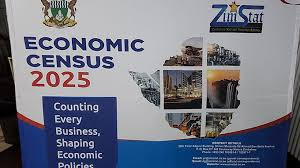
ZIMBABWE National Statistics Agency (ZimStat) has released data from the inaugural economic census, which presents a headache for authorities.
The economic census covered the period June 2024 to March this year.
The census, which covered 204 798 operations, showed that 76,1% of assessed establishments were informal and driven by trading. The remainder (23,9%) were formal.
A formal establishment is registered by the Registrar of Companies and Registrar of Co-operatives, the Zimbabwe Revenue Authority (Zimra) and the National Social Security Authority.
What the ZimStats data shows is that we now have an economy of hustlers, the “sell anything” brigade to survive the harsh environment.
This is coming at a time when formal businesses are shrinking, with companies running with idle capacities.
Statistics from the Confederation of Zimbabwe Industries show that capacity utilisation, a measure of how efficiently a company or nation uses its installed productive capacity, has been declining over the years. It fell to 52,3% last year from 53,2% in 2023.
The drop marked the third consecutive year of decline, underscoring the continued strain on the country’s industrial base.
- War over super car stuck in river
- Zimra seizes CCC campaign vehicle
- Thousands flee economic mess
- ZimStat undertakes to pay enumerators
Keep Reading
ZimStat said while the informal sector was increasingly becoming a significant source of livelihoods, its contribution to government revenue remained minimal due to non-compliance with the tax system.
The census is a wake-up call for government.
The first step is to interrogate why the formal economy is shrinking. The answer lies in government’s policies that tend to strangle formal businesses.
There is over-regulation in the economy, which is stifling the growth of businesses willing to comply.
Statistics show that there are at least 50 taxes that businesses must comply with. Added to that is an aggressive tax collector that has left companies on the brink.
Companies are being slapped with additional tax bills after assessment which they are disputing. Two firms have taken the Zimbabwe Revenue Authority (Zimra) to court, disputing additional bills.
Those that intended to formalise will think twice.
Authorities must simplify compliance procedures for the informal sector to formalise their operations. They must roll out incentives rather than adopt an aggressive approach. Once they formalise, the tax base will expand.
Currently, tax authorities are squeezing the few companies that have formalised their operations.
Some companies have entered corporate rescue, illustrating the depth of the economic crisis.
Others are living on borrowed time, owed millions by government.
The economic census has given an insight into the state of the economy, which should facilitate evidence-based policy formulation, decision-making and strategic planning.
The high informalisation has distorted the employment statistics, with analysts disputing government claims that unemployment is below 20%.
The new ZimStat data shows that the old economy is dead and a new economy has been born.
However, this new economy needs to be formalised so that it gives “Caesar what belongs to Caesar”. In the absence of that, tax inflows to Treasury will take a knock.






